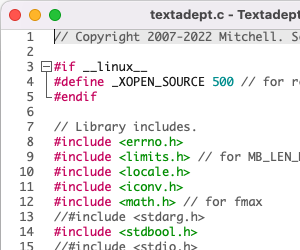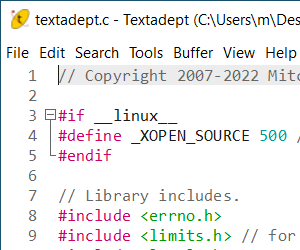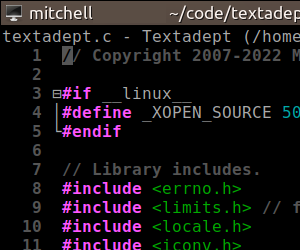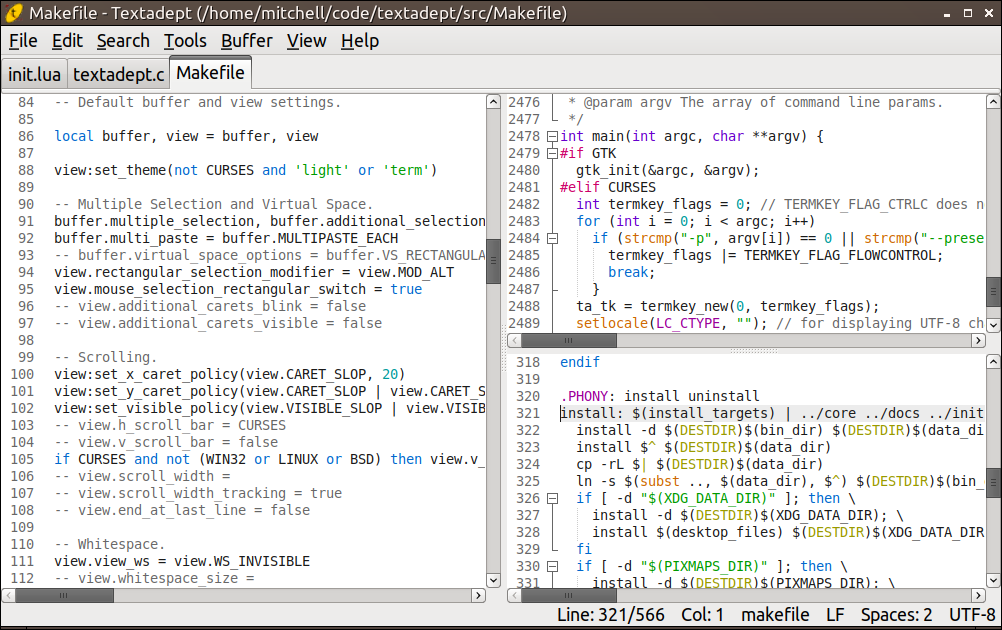Textadept is a fast, minimalist, and remarkably extensible cross-platform text editor for programmers. Written in a combination of C, C++, and Lua and relentlessly optimized for speed and minimalism for more than 12 years, Textadept is an ideal editor for programmers who want endless extensibility without sacrificing speed and disk space, and without succumbing to code bloat and a superabundance of features. The application has both a graphical user interface (GUI) version that runs in a desktop environment, and a terminal version that runs within a terminal emulator.
- Fast and minimalist.
- Cross platform, and with a terminal version, too.
- Self-contained executable -- no installation necessary.
- Support for over 100 programming languages.
- Unlimited split views.
- Can be entirely keyboard driven.
- Powerful snippets and key commands.
- Code autocompletion and documentation lookup.
- Remarkably extensible, with a heavily documented Application Programming Interface (API).
In its bid for minimalism, Textadept depends on very little to run. On Windows and macOS, it has no external dependencies. On Linux, the GUI version depends only on either Qt or GTK (cross-platform GUI toolkits), and the terminal version depends only on a wide-character implementation of curses like ncurses(w). Lua and any other third-party dependencies are compiled into the application itself.
Textadept releases can be found here. Select the appropriate package for your platform. A comprehensive list of changes between releases can be found here. You can also download a separate set of modules that provide extra features and functionality to the core application.
Textadept comes with a comprehensive user manual in its docs/ directory. It covers all of Textadept's main features, including installation, usage, configuration, theming, scripting, and compilation.
Since nearly every aspect of Textadept can be scripted using Lua, the editor's API is heavily documented. This API documentation is also located in docs/. It serves as the ultimate resource when it comes to scripting the application.
Textadept can be built on Windows, macOS, or Linux using CMake. CMake will automatically detect which platforms you can compile Textadept for (e.g. Qt, GTK, and/or Curses) and build for them. On Windows and macOS you can then use CMake to create a self-contained application to run from anywhere. On Linux you can either use CMake to install Textadept, or place compiled binaries into Textadept's root directory and run it from there.
General Requirements:
- CMake 3.16+
- A C and C++ compiler, such as:
- GNU C compiler (gcc) 7.1+
- Microsoft Visual Studio 2019+
- Clang 13+
- A UI toolkit (at least one of the following):
Basic procedure:
- Configure CMake to build Textadept by pointing it to Textadept's source directory (where CMakeLists.txt is) and specifying a binary directory to compile to.
- Build Textadept.
- Either copy the built Textadept binaries to Textadept's directory or use CMake to install it.
For example:
cmake -S . -B build_dir -D CMAKE_BUILD_TYPE=RelWithDebInfo \
-D CMAKE_INSTALL_PREFIX=build_dir/install
cmake --build build_dir -j # compiled binaries are in build_dir/
cmake --install build_dir # self-contained installation is in build_dir/install/
CMake boolean variables that affect the build:
NIGHTLY: Whether or not to build Textadept with bleeding-edge dependencies (i.e. the nightly version). Defaults to off.QT: Unless off, builds the Qt version of Textadept. The default is auto-detected.GTK3: Unless off, builds the Gtk 3 version of Textadept. The default is auto-detected.GTK2: Unless off, builds the Gtk 2 version of Textadept. The default is auto-detected.CURSES: Unless off, builds the Curses (terminal) version of Textadept. The default is auto-detected.
For more information on compiling Textadept, please see the manual.
Textadept is open source. Feel free to discuss features, report bugs, and submit patches. You can also contact me personally (orbitalquark att triplequasar.com).





